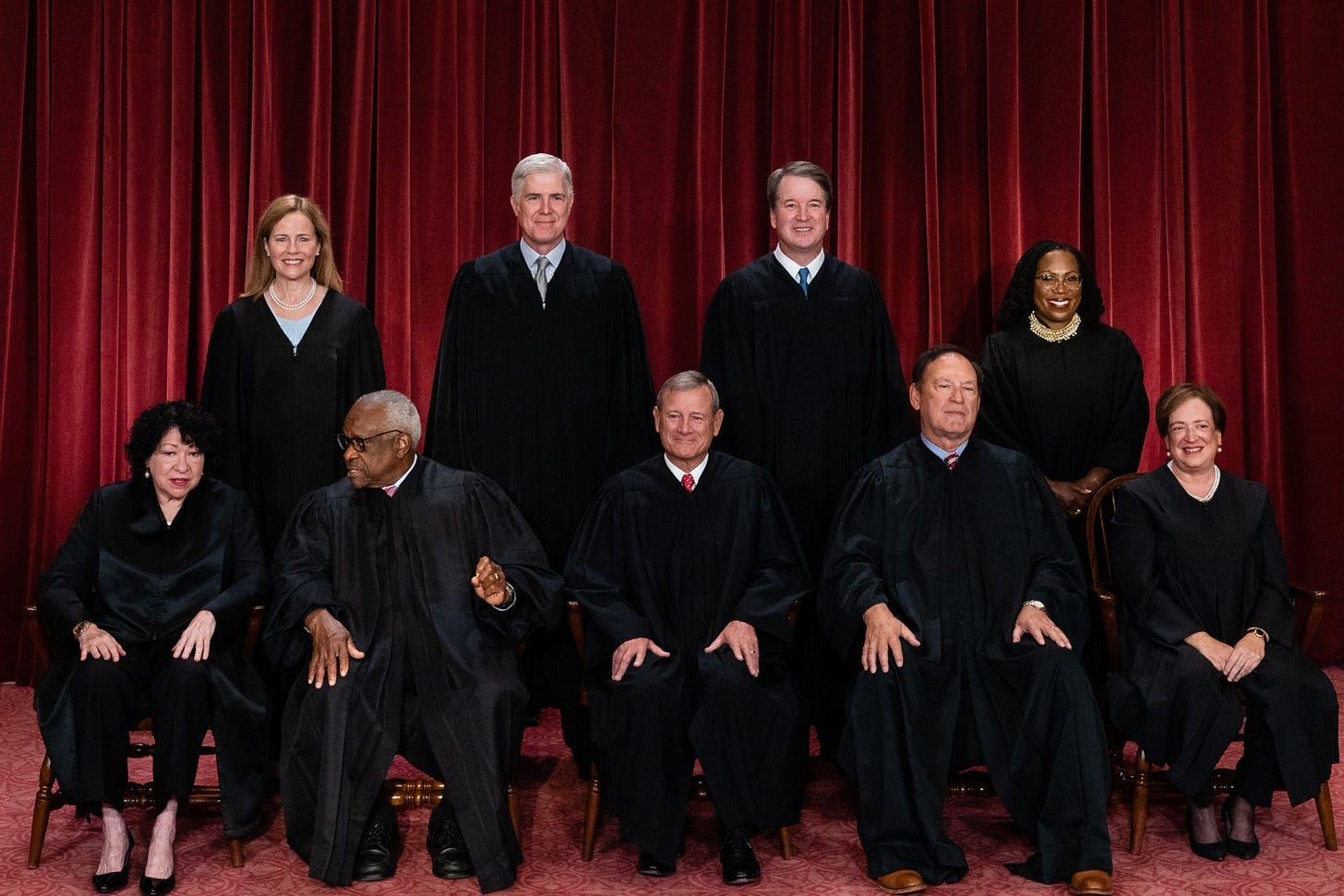A recent Amy Howe summary of remaining cases helpfully provides information, including a link to the case page which also will include the opinion. Yes, there now will be a fourth day on July 1st, which is rare in recent decades, with COVID pushing things back in 2020 providing a rare exception.
The delay on some level doesn't matter. What does a few days matter? It isn't just that they want to delay the Trump case until after the debate. They could do it tomorrow. Anyway, the real problem there was both taking the case and slow walking it.
Today's federal law/anti-administrative state day. The abortion ruling wrongly posted yesterday also dropped. On that, yes, it is not a "victory for abortion rights."
I support Jackson's partial dissent. She (partially) dissented from the bench. It helps that ultimately her vote didn't matter. That allows you to more easily go further.
Sotomayor and Kagan are concerned about patients in need of emergency care. If there was a firm five to deny them care, a temporary stay would be of some use. We can talk about sending a message in November but this narrow issue net is of limited value there.
Without carefully looking, the general assumption seems to be that the content of the opinion that was wrongly posted is the same, minus typos and formatting issues. Another case is pending in the Fifth Circuit on this issue. So, this issue will be back to the Court soon.
Then, we will see what the conservative six will do. Barrett (with Roberts and Kavanaugh) seems to want to find a way to wish the problem away. Alito (with Thomas and Gorsuch) wants to deny there is a problem while tossing in "unborn child" repeatedly. Dobbs remains horrible law.
The big bankruptcy case involving OxyContin split the liberals. Jackson silently went along with Gorsuch's opinion while the other liberals (and Roberts) joined a Kavanaugh dissent arguing it unnecessarily harmed the victims. She probably thought congressional intent and the law itself required that result. The case is complicated. Neither side is great.
[ETA: An important context to this decision is that the U.S. government opposed the deal that was struck down. Like the death penalty, there is also no one answer the victims' support. It's a hard case.]
The SEC result (written by Roberts with Gorsuch/Thomas having a preachy concurrence) limited the harm. It involved a big attack on the agency along with a more limited challenge resting on the need for civil juries. The majority took that route.
Sotomayor for the liberals still strongly dissented. Long practice allowed not using juries (which to be clear conservatives are not so keen about in a variety of cases) in this context.
Some liberals were sympathetic to a jury requirement. And, it is unclear just how problematic the result will be in practice. Nonetheless, it comes off as an anti-administrative state result with a wider reach than this one agency. Sotomayor dissented from the bench.
Preaching about "due process" or not caring about the enforcement dynamics since that's just "political" while this is constitutionally required is simplistic. Also, yes, Justice Brennan supported juries in some cases in this context. But, the dissent argues only in a limited way.
The fourth case was a special hearing (maybe Steve Vladeck's shadow docket writings are getting to them) to determine if the EPA should hold up "good neighbor" air pollution regulations. The guys (Gorsuch) vs. the gals (Barrett) in this case with Barrett having a strong dissent about how unfounded it is for SCOTUS to reach out to delay.
[Barrett is a gettable vote in these procedural cases. She has stated determining when a stay is required is a judgment call.]
Added trivia: Gorsuch’s mom headed the EPA in the Reagan years.
==
Meanwhile, Oklahoma executed Richard Norman Rojem Jr.
Richard Norman Rojem Jr., 66, was sentenced to death after kidnapping, raping and murdering a 7-year-old girl in 1984. He raped before.
His harassment of the girl’s family helped lead her father to commit suicide. Rojem continued to show signs of violence in prison, early on even taking part in a murder-for-hire plot. He testified for the prosecution. Suffice it to say he is a hard case for death penalty opponents. The main argument is that it took forty years.
There were no final appeals to the Supreme Court. I don’t think the public safety net improved much. Perhaps, the family has a bit more “closure” or relief. Families have mixed feelings there. I don’t think supporting his execution makes you a monster.
I don’t support it. The death penalty net is bad even if some cases are easier than others. Even this one took way too long. Stephen Breyer in Glossip v. Gross explains why that is a problem. See you tomorrow.
==
Note: These are complicated opinions, each with a sort of asterisk to them (the EPA case is probably the easiest to disagree with). See SCOTUSBlog, Slate, Vox, and Chris Geidner (Law Dork) et. al. for more details.




